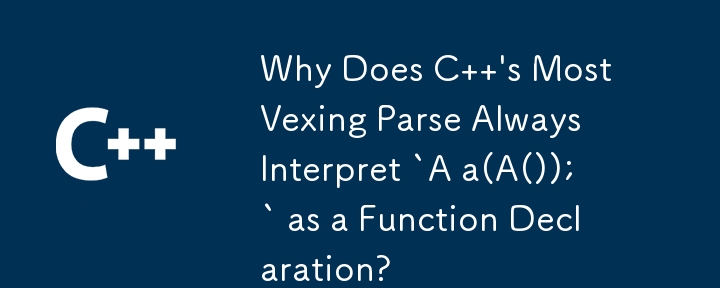Home >Backend Development >C++ >Why Does C 's Most Vexing Parse Always Interpret `A a(A());` as a Function Declaration?
Why Does C 's Most Vexing Parse Always Interpret `A a(A());` as a Function Declaration?
- Patricia ArquetteOriginal
- 2024-12-24 02:19:10313browse

Understanding the Most Vexing Parse Anomaly
In C , the controversial Most Vexing Parse (MVP) rule dictates that a specific syntax ambiguity is always interpreted as a function declaration, despite the majority of programmers expecting otherwise. This anomaly arises from the following syntax:
A a( A() );
Ambiguity Resolution
This code can be parsed in two ways:
- As a variable definition of class A taking an anonymous instance of A.
- As a function declaration for a function that returns an object of type A and takes a single unnamed parameter that returns type A.
According to the MVP rule, the code must be interpreted as the second option, despite most programmers expecting the first.
Rationale for the Standard
The MVP rule was introduced to maintain consistency in C semantics. Without it, the same syntax could be interpreted as either a variable definition or a function declaration, depending on the context. This would have introduced ambiguity and reduced code readability.
Consider the following example:
A foo;
This line is clearly a variable definition. However, if MVP did not exist, the following line would be ambiguous:
A foo();
It could be interpreted as either a variable definition with an empty parenthesis or a function declaration. By enforcing the MVP rule, this ambiguity is eliminated.
Conclusion
The MVP rule enforces consistency in C syntax by always interpreting ambiguous code as a function declaration. While this choice may seem counterintuitive to some programmers, it provides a clear and unambiguous parsing mechanism, reducing the potential for errors and improving code readability.
The above is the detailed content of Why Does C 's Most Vexing Parse Always Interpret `A a(A());` as a Function Declaration?. For more information, please follow other related articles on the PHP Chinese website!
Related articles
See more- C++ compilation error: A header file is referenced multiple times, how to solve it?
- C++ compilation error: wrong function parameters, how to fix it?
- C++ error: The constructor must be declared in the public area, how to deal with it?
- Process management and thread synchronization in C++
- How to deal with data splitting problems in C++ development

